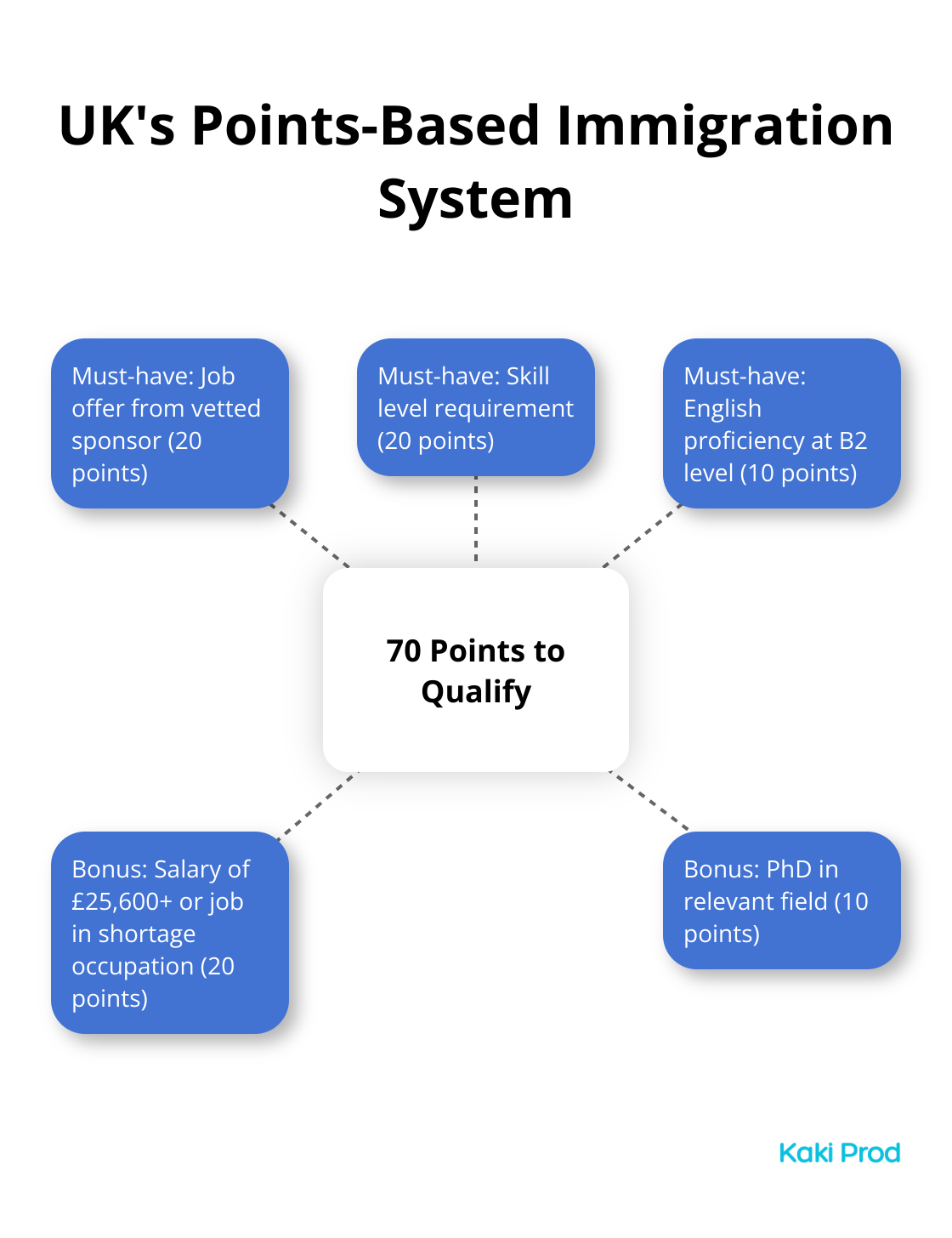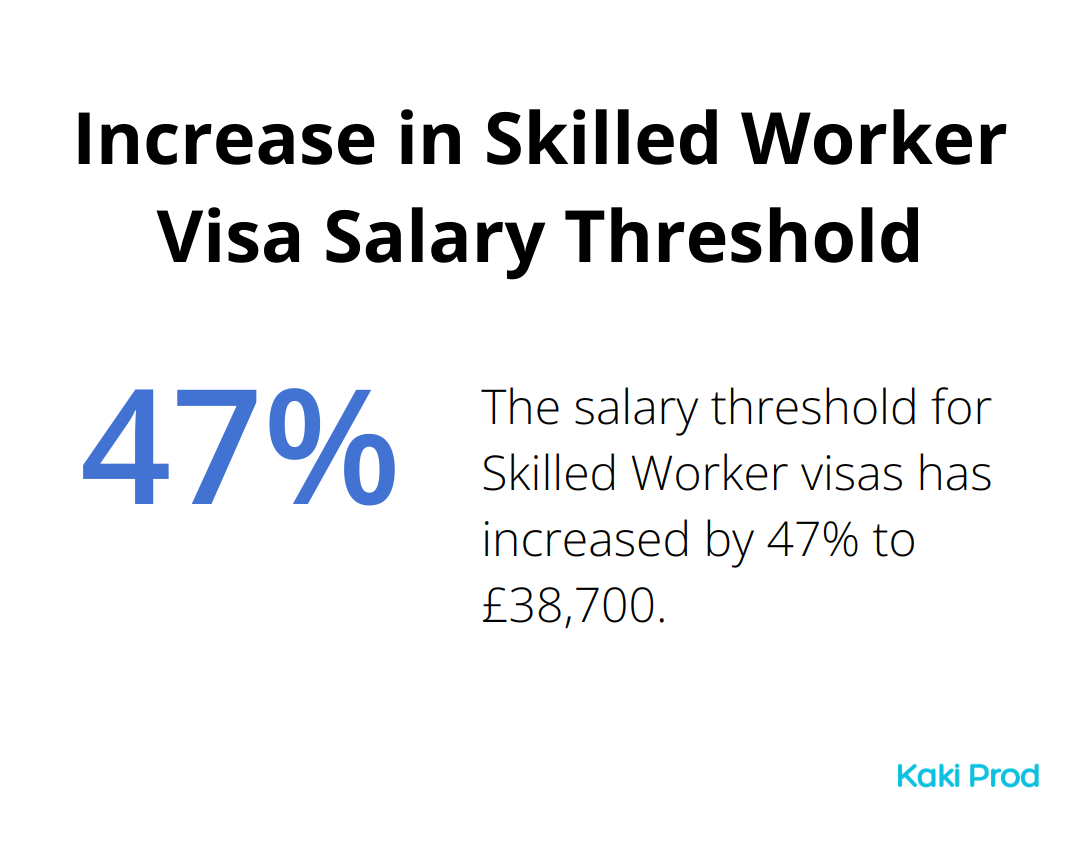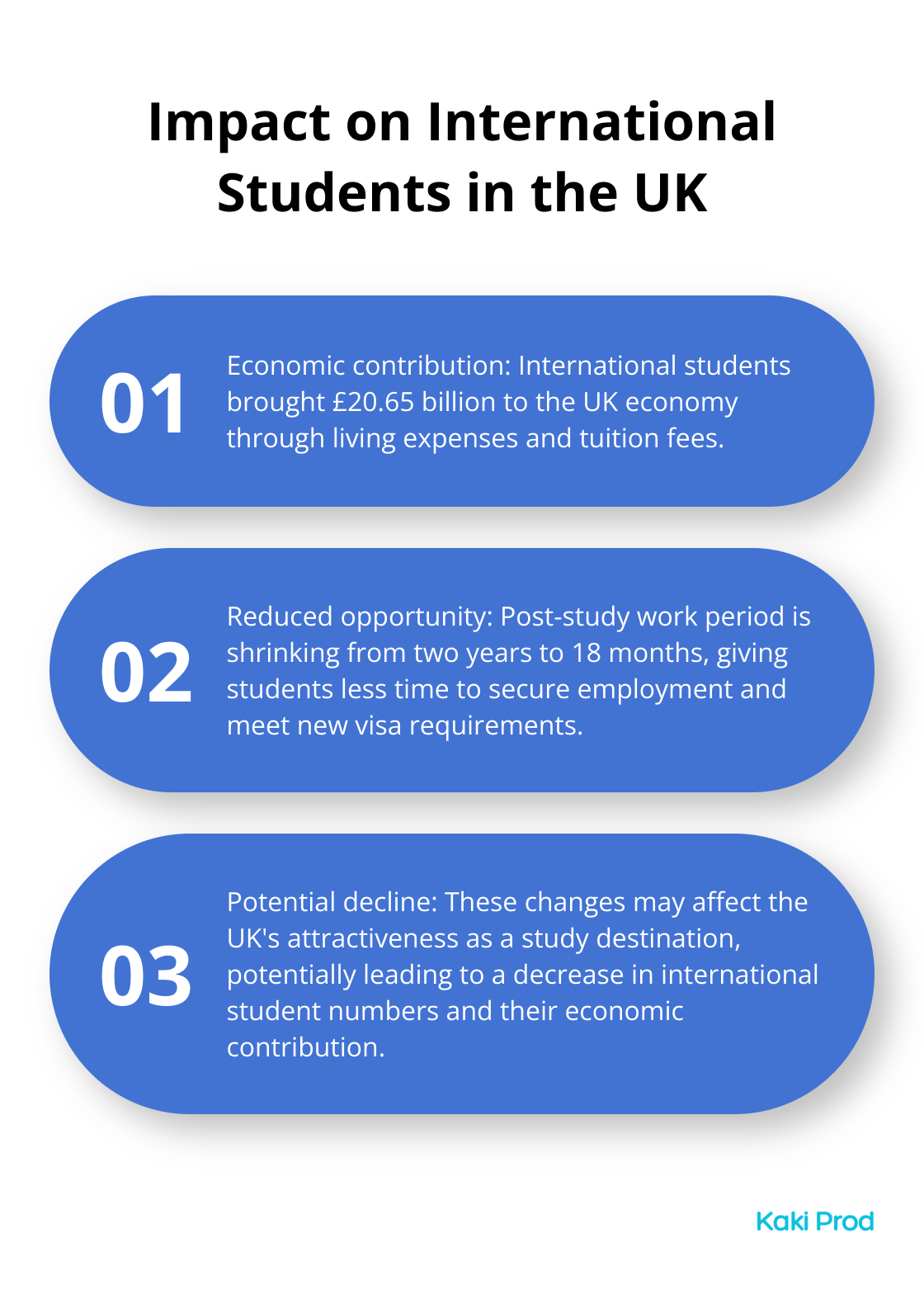The UK’s immigration scene is seeing a major shake-up in 2025. And at Kaki Prod… we’ve dissected the new rules so you don’t have to.
Here’s the deal: UK immigration is all about that points-based system now—revamping visas like they’re reorganising a cluttered closet. Businesses, international students, families, EU citizens—everyone’s in the splash zone. It’s a brave new world, folks, on how these shifts will ripple through the ecosystem.
How the UK’s New Points-Based Immigration System Works
Points-Based System Explained
So, the UK’s got a fresh immigration system for 2025, and it’s all about stacking up those points. You aim for 70 points-qualify or nada. Here’s the scorecard:
- 50 must-have points: You need a job offer, but not just any-it has to be from a vetted sponsor (20 points), a position that’s on the skill level radar (20 points), and oh, brush up on your English to the B2 benchmark (10 points).
- 20 bonus points: Pull in at least £25,600 a year (20 points), or snag a gig that’s in dire need of more hands (20 points), or be the PhD brainiac in the room (10 points). Your call.

Key Changes from Previous Rules
Buckle up, because the new deal raises the stakes. The skill bar just jumped from RQF Level 3 to RQF Level 6-ouch, that leaves about 180 job roles in the dust. So, say cheers to fewer mid-skilled workers in sectors like hospitality and logistics.
And get this-the salary benchmark? It’s through the roof. If you’re a skilled worker, anything below £38,700 won’t cut it. That’s gonna put the squeeze on businesses hunting for talent from abroad.
Plus, it’s curtains for the Adult Social Care visa. No new applicants here-it’s all hands on deck for homegrown solutions.
Implementation Timeline
Here’s how it unfolds:
- May 13, 2025: Say goodbye to the special visa for social care workers
- Mid-2025: Prep for the switch to new English language benchmarks (CEFR Level B2)
- Late 2025: Amp up to newer salary figures
- 2026-2028: More shifts coming in-like longer waits for settlement
The big picture? The goal is to wrap up most changes by the end of this Parliament around 2029. But don’t hold your breath-some bits (like the international student fee changes) might need new laws and, yep, a bit more time.
Impact on Different Sectors
Prepare for a shake-up. Businesses must rethink their hiring game. International students? Better sort your post-grad options now. And families? Brace for tighter financial hoops to jump through.
Tech folks, heads up-filling those roles could get trickier. Meanwhile, construction and manufacturing might be left scrambling for good help in those mid-level jobs.
Preparing for the New System
Ready to tackle this new playbook? Here’s the game plan:
- Keep tabs on the latest scoop (the Home Office website is your new best friend)
- Get a head start on visa matters (applications and whatnot)
- Look into skill-boosting opportunities for your team
- Eye alternative visa paths (like the Global Talent visa for those super skilled guys and gals)
As the UK eases into this makeover, it’s all about understanding and prepping for the ride ahead. Up next, let’s drill down into specific visa category changes and what they mean for different immigrant groups.
What’s New in UK Visa Categories for 2025?
Hold on to your hats-the UK’s visa game is getting a major makeover in 2025. We’re talking a total revamp that’ll hit skilled workers, students, and families right where it counts. Let’s break it down so even your grandma could get it.
Skilled Worker Visa: Higher Standards, Higher Salaries
So, about that Skilled Worker visa overhaul… buckle up. The salary threshold is shooting up to £38,700 per year (or even more if your role demands it). Translation: businesses might have to rethink their playbook on hiring from abroad.

Oh, and guess what? The Immigration Salary List-poof, gone! No more sneaky discounts based on job type. It’s all about fairness now (or so they say), but good luck to industries trying to snag international talent.
Student Visa: Stricter Rules, Shorter Post-Study Work Period
International students, take note. The rules are getting tighter. That sweet post-study work period is shrinking from two years to 18 months. Less time to land that gig and switch to a work visa. Tick-tock.
Universities are also getting the squeeze with tougher compliance rules for their sponsor licences, meaning the application process isn’t going to get any easier.
And here’s a kicker-they might slap a levy on universities for international student fees. Yep, more legislation would need to happen, but it could mean tuition costs might go up. Brace yourselves.
Family Visa: Increased Financial Requirements
Got a family? The visa hoops just got higher. Financial requirements for sponsors are jumping. Now, sponsors for partner visas need to show a cool £29,000 a year (up from £18,600).
Plus, they’re throwing in a basic English test for dependents. So, if you’re jetting to the UK with the fam, better start on those English lessons yesterday.
Entrepreneur and Investor Routes: Focus on High-Potential Individuals
Looks like the UK wants the A-listers-specifically in tech and creative spaces. Plans are brewing to broaden the paths for high-potential folks. Expect tweaks to the Global Talent and High Potential Individual visas.
But don’t get too comfy. With immigration rules tightening, these routes are gonna have more eyes on them. The days of just “buying” your way into the UK? Might be on their last legs.
As the new rulebook unfolds in the next few years, staying in the loop is your best strategy. Some of these changes might need a green light from Parliament, so lookout for potential curveballs. Up next, we’ll dive into how these rules shake up different sectors and folks in the UK.
Who Feels the Impact of UK’s New Immigration Rules
Businesses Face Hiring Hurdles
UK employers will encounter significant challenges. Here’s the deal – any role below RQF Level 6 has to be on the TSL to snag a Skilled Worker visa. And just wait, because in the not-so-distant future, even RQF Level 6 spots might get hit with restrictions. This is gonna crush sectors like hospitality and logistics.
The new £38,700 salary threshold for skilled workers is a game-changer. We’re talking a shift from RQF 3 (think A Level) to RQF 6 (degree-level). Small businesses and startups? They could be gasping for air trying to meet these marks. Tech companies – already neck-deep in talent scarcity – might watch their hiring pools evaporate.
Businesses have got their work cut out for them – time to pump some serious cash into upskilling their current folks. Remote work with overseas talent? Yeah, that might be on the table to dodge the visa woes. Some might have to completely rethink how they’re running their show.
International Students: Time Crunch and Pressure
So, about that post-study work period shrinkage from two years to 18 months – it’s gonna hit international students hard. Less time to nail down a job with those juicy new, higher salary requirements.
International students brought in a cool £20.65 billion to the economy via living expenses and tuition. But if student numbers take a dip? Yeah, that’s gonna shrink too. These changes could dent the UK’s standing as a go-to study hub. Students might shift their sights towards friendlier post-study locales (think Canada or Australia).

For those dead set on the UK, early job hunting is a must. Networking? Absolutely essential. Grabbing internships or part-time gigs in their study area can skyrocket their odds of landing a gig that ticks the new visa boxes.
Families Confront Financial Barriers
Financial hurdles are looming large for family visas. With the income threshold shooting up to £29,000 for sponsoring a partner, many families could find themselves between a rock and a hard place.
The Migration Observatory over at the University of Oxford figures that 40% of UK employees won’t touch this new threshold. Family-based migration could nosedive, shaking up sectors that lean on migrant workers.
Families eyeing the UK need to kickstart financial strategies pronto. Upskilling for better earning power might be the ticket. Scoping out regions in the UK where living costs are a breeze could make hitting the income threshold a little less daunting.
EU Citizens: Post-Brexit Reality Sets In
The free movement party’s over for EU citizens. They’re now in the same boat as non-EU migrants – think higher costs, mountains of paperwork, and maybe longer queues.
The Office for National Statistics reported a net migration drop of -95,000 for EU nationals up to June 2024. Brace yourselves – this trend isn’t going anywhere anytime soon.
EU citizens hanging out in the UK need to lock down their settled or pre-settled status. Those plotting their move should kick off the visa drill way ahead of time and brace for a pricier, more intricate relocation journey.
Additional Information: Official Sources & UK Points-Based System (2025)
Official Sources
To improve the credibility of your article, consider referencing these trusted sources:
- The UK Government Immigration White Paper (May 2025) outlines proposed reforms to control net migration and adjust settlement rules.
- The UK Parliament Research Briefing analyzes the legislative and social impact of the 2025 immigration changes.
- The GOV.UK Immigration Rules Update Page provides real-time updates on visa and residency policies.
🎯 UK Points-Based Immigration System (2025)
Under the UK’s revised points-based system:
- A job offer from an approved sponsor is required.
- The job must meet a minimum salary and skill threshold.
- Applicants must prove English language proficiency.
- Bonus points may be granted for shortage occupations, STEM PhDs, or UK education.
Frequently Asked Questions (FAQ)
Q1: What are the new rules for UK visas in 2025?
The UK plans to raise the required skill level for visas to degree-qualified jobs, extend the settlement period to 10 years, and make caregiver and graduate visas more restrictive. Details are outlined in the 2025 UK Immigration White Paper.
Q2: Is the UK removing PSW in 2025?
Not entirely. The Graduate Route (Post-Study Work) is being shortened, not removed. The government aims to limit its duration and accessibility to reduce migration.
Q3: Can I apply for British citizenship in 2025?
Yes, if you meet the criteria: residency, English language skills, and passing the Life in the UK Test. However, proposals may increase the residency requirement from 5 to 10 years, as noted in this Guardian report.
Q4: What is the 10-year rule for immigration in the UK?
It refers to the proposed extension of settlement eligibility from 5 to 10 years for many visa categories, requiring a longer commitment before gaining Indefinite Leave to Remain (source).
Q5: How long do you have to live in the UK to become a permanent resident?
Previously 5 years, it may now shift to 10 years under the new proposals from the UK Home Office.
Q6: What happens after 5 years of stay in the UK?
Under older rules, you could apply for permanent residency. Now, you may need to wait another 5 years, according to Reuters.
Q7: What happens if you stay outside the UK longer than 6 months?
Leaving the UK for more than 180 days in a 12-month period could reset your continuous residency, affecting both settlement and citizenship eligibility.
Q8: What is the easiest way to get PR in the UK?
The Skilled Worker route remains the most straightforward path—if your occupation is eligible and you meet salary/language requirements. See the official UK visa guide.
Q9: How long do you have to live in the UK before you can get a British passport?
Generally, you need to:
- Live in the UK for 5 years,
- Hold Indefinite Leave to Remain for at least 1 year,
- Then apply for citizenship, followed by a British passport.
Proposals in 2025 might change this timeline to 10 years.
Q10: Can I live in the UK if I am Canadian?
Yes. Canadians can move to the UK under several pathways like the Skilled Worker visa, Youth Mobility Scheme, or family sponsorships.
Q11: How much does British citizenship cost?
The naturalisation fee is £1,330, with additional fees for the Life in the UK test and English test. See all current fees here.
Q12: Can I live in the UK if I marry a British citizen?
Yes. You can apply for a UK spouse visa, which allows you to live and work in the UK, provided you meet relationship and income criteria.
Final Thoughts
So, the UK is about to flip the script on immigration in 2025. New rules, folks… tighter hoops to jump through if you’re a skilled worker, international student, or a family looking to settle. The plan? Slash net migration and roll out the welcome mat for high-skilled talent. Big shift, right? And it’s bound to leave its mark on the UK’s culture and economy-reshape it, even.
Now, let’s talk ripple effects. Long-term, these changes could shake things up-big time. Some industries? Might hit a wall trying to fill jobs. Others? Could kick into high gear with automation and beefing up local talent-silver linings, anyone? Plus, we might see a whole new face on the UK’s immigrant landscape, demographically speaking.
Here’s the deal-keeping tabs on these changes? Non-negotiable. If UK immigration policies are your beat, Kaki Prod has your back with resources on personal growth and career mojo to sail smoothly through this sea change. We’ve got your six as you and your business navigate the shifting sands of the UK’s immigration scene.

